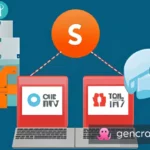Table of Contents
Artificial Intelligence (AI) has made remarkable strides in various domains, transforming industries and our daily lives. However, with the great power of AI comes the responsibility to ensure the privacy and security of users’ data. In recent years, concerns have arisen about the potential misuse and leakage of sensitive information processed by AI models. To address these concerns, researchers have been exploring methods to create private and secure AI models. One such initiative that has gained attention is this ProtectedGPT.
What is PrivateGPT?
This GPT is an innovative approach that aims to enhance the privacy of AI models while maintaining their effectiveness. The project is based on the renowned GPT (Generative Pre-trained Transformer) architecture, which is widely used for natural language processing tasks. It introduces privacy safeguards through the integration of differential privacy techniques.
Differential Privacy: A Brief Overview
Differential privacy is a mathematical framework that provides strong privacy guarantees for individuals whose data is used to train AI models. The core idea of differential privacy is to inject carefully calibrated noise into the data to make it more challenging to reverse-engineer sensitive information about any individual in the dataset. This way, even with access to the model’s outputs, it becomes extremely difficult to infer specific details about any particular user’s data.
How PrivateGPT Works:
It combines the powerful language generation capabilities of GPT with differential privacy mechanisms to ensure user data remains confidential. During the training process, the model is exposed to a specially crafted dataset that incorporates randomized noise. This introduces an element of uncertainty that further protects individual privacy.
The degree of privacy provided by this safe GPT can be adjusted using a parameter called “privacy budget.” A lower privacy budget offers stronger privacy guarantees but may result in slightly reduced model accuracy, while a higher budget may provide better accuracy at the cost of reduced privacy. This flexibility allows users and developers to find the right balance between privacy and utility for their specific use case.
Benefits of PrivateGPT:
- Enhanced Privacy: Integration of differential privacy techniques ensures that users’ sensitive information is protected, reducing the risk of data breaches or privacy violations.
- Robust AI: Despite introducing noise during training, GPT maintains a high level of effectiveness, making it a reliable option for various NLP tasks.
- Customizable Privacy Budget: The ability to adjust the privacy budget allows for tailored privacy requirements, making it suitable for different applications.
- Ethical AI Development: By incorporating privacy measures, developers can demonstrate a commitment to ethical AI practices and responsible data handling.
Challenges and Future Prospects:
While PrivateGPT is a promising step towards secure AI, there are some challenges to address. Striking the right balance between privacy and utility remains a critical aspect, and ongoing research is needed to optimize the trade-offs.
To learn more about this Secure-Safe GPT and explore the project in detail, you can visit the official GitHub repository: [GitHub] https://github.com/imartinez/privateGPT
PrivateGPT is an exciting development in the realm of private and secure AI. By combining the power of GPT with differential privacy, it offers a robust solution for safeguarding sensitive user data without compromising on the model’s effectiveness. As privacy concerns continue to grow, initiatives like this pave the way for a more ethical and secure AI landscape, benefiting users, developers, and society as a whole. However, as with any emerging technology, ongoing research and collaboration are necessary to push the boundaries of privacy-preserving AI and build a safer digital future.
#ArtificialIntelligence #AI #PrivateGPT #DifferentialPrivacy #GPTArchitecture #NLP #UserPrivacy #EthicalAI #PrivacyBudget #RobustAI #msrajawat298 #SecureAI #DataPrivacy #garimarajput748 #garimarajput #EmergingTechnology #AIResearch #DigitalFuture #GitHubRepository
Artificial Intelligence, AI models, PrivateGPT, differential privacy, privacy safeguards, GPT architecture, natural language processing, user data, privacy budget, enhanced privacy, robust AI, customizable privacy, ethical AI development, challenges, future prospects.
For More Posts Click Below:
Introducing CasaOS: A User-Friendly Web Hosting Solution for Your AWS EC2 Instances
Resolving the Redirection Issue for Seamless Access to Public Domain – A Solution Guide
Automating Secure SFTP User Setup with a Bash Script
Why and How to Publish a Custom Plugin to the WordPress Repository: 7 Key Steps for Success












